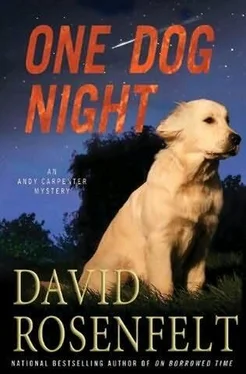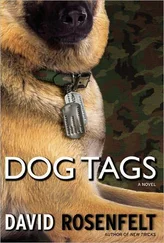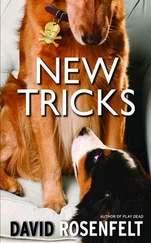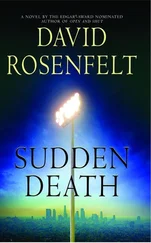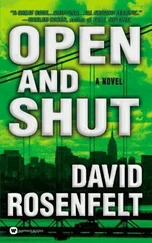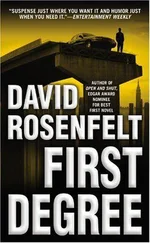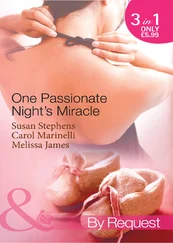Holland kisses Alice on the cheek, then picks Benji up and gives him a hug and kiss. Then he closes the door and leaves.
He heads for his car, in front of the house. I get out of my car across the street, and call to him just as he’s opening his door. “Judge Holland,” I say.
He looks up in surprise; I have no idea whether he recognizes me or not, but he doesn’t say anything, just stares at me.
“I’m Andy Carpenter.”
“Leave me alone,” he says.
“I can’t do that. I’m here to talk about Benji.”
It was an educated guess, and it’s only when I see him stiffen that I have confidence that I’m right.
He quickly recovers, gets in the car and drives away. I get back in my car and follow him, and we drive about twelve blocks. He’s not going quickly, making no apparent effort to lose me, though it wouldn’t be tough to do so. Car-following is not my specialty.
He turns into a small park, not at all well lit, and I follow him in. There are tennis courts near the rear of the park, and he pulls up and parks his car in a small parking lot adjacent to them.
I’m not at all comfortable with this. I’m not panic-stricken; following a judge to suburban tennis courts is not exactly like meeting Double J in his drug hideout. On the other hand, I don’t have Marcus with me.
I don’t see how he can be leading me into a trap; it’s not like he knew that I would show up. On the other hand, he could have called from his car and told them where we were going. I think they have cell phones in Delaware.
My hope is that he is willing to talk with me, but wanted to lead me somewhere private. That seems the most logical explanation, so I get out of the car when he does, and I walk toward him.
“So, Mr. Carpenter, what do you know?”
Judges have been seeing through my bullshit for years, so I decide to be straight with this one. “I don’t know much for sure, but I have very strong hunches, and they are hunches that can be verified. What I do know is that you adopted Benji before you were married, not unheard of, but an unusual thing for a single man to do.
“I also know that the mother of Roger Briggs, the boy who was supposed to have died in that fire six years ago, moved to Paterson from here in Dover. What I believe is that Roger Briggs is Benji, and that you are his real father. I believe that after his mother left and gave birth, she wouldn’t give you access to him. Maybe she was trying to extract money from you… I don’t know. So you hired people to bring him to you, and they set the fire.”
He nods slowly in a final confirmation that I’m right. “They were supposed to give her money, or scare her, or both. She was an addict, Mr. Carpenter. She couldn’t take care of him; she couldn’t give him any kind of life.”
“Why did they burn the house down?”
“I don’t know,” he says. “Maybe to hide the fact that he was missing, but I’ve always thought there was much more to it. He would never tell me. But no one was supposed to get hurt; he had promised me that.”
“Loney?”
“Yes.”
“So they had you on tape, and they could connect you to the fire. That’s how they blackmailed you.”
“Yes.”
“They told you how to rule in the Milgram trial.”
“Yes.”
“Did they demand anything else?”
“No.”
“You need to tell the truth now. You can’t let Noah Galloway be convicted of this crime.”
“They would take Benji; Alice is his mother, as surely as if she gave birth to him. He needs her, and she needs him.”
“You don’t understand,” I say. “I know the truth. I’ll reveal it with or without you.”
“No one will believe you. I’m a respected judge.” He laughs a short laugh, recognizing the irony.
“You’re wrong about that,” I say, even though I know he’s probably right.
“No,” he says, and in the dim light I can see him reach into his pocket and take out a gun. There is a glint of light off the barrel.
“Don’t do it, Judge. People know where I am, and they know why.” Even in my panic, the irony that a judge might shoot me is too obvious to miss. They’d probably never find another judge to convict him.
“I know something about guilt, Mr. Carpenter. I’ve lived with it for many years. You needn’t suffer with it; I was coming here anyway.”
I don’t know what he’s talking about, but it only takes a few seconds to find out.
“Don’t take my son from his mother,” he says, just before he puts the barrel of the gun to his temple and pulls the trigger. He says another word, but it is mostly drowned out by the sound of the shot. I think it was “please.”
It was the most horrible thing I’ve ever seen, and nothing comes in second.
Judge Holland’s head literally exploded, sending pieces of it in all directions.
It all happened too quickly for me to react. Of course, the truth is that my reaction time in moments of physical danger is such that he would have had time to load a Revolutionary War cannon and shoot himself with it.
I edge over to his fallen body, but I don’t get too close. There is no way he could possibly be alive, and I wouldn’t know what to do if he was. Instead I call 911 and report what has happened. I don’t really know where I am, so it’s hard to direct them to the scene. I do the best I can, and they seem to be confident that they will find me.
Before the police arrive, I call Cindy Spodek and tell her what has happened. “A judge, Andy?” she asks.
“Not just a judge. The presiding judge of the Delaware Chancery Court.”
She tells me to hold while she notifies agents in the area, then gets back on the line. “Are you okay?” she says. “I’ve seen someone commit suicide before; it was probably ten years ago and I still can’t get the image out of my mind.”
“It’s going to be a while,” I say, as the police cars and an ambulance make their appearance. “Gotta go, the locals are here.”
“Don’t let them take you anywhere until our agents get there.”
The police come out of their cars, guns drawn, as is appropriate for the situation. They have no way of being sure what really happened here; for all they know I could have been the shooter. They have me turn and put my hands against my car, and then frisk me.
They tell me to wait, and I hear one of the officers, who is looking at Holland’s body, say, “I’m pretty sure it’s him.”
This is going to be a monster of a story. Anything unsavory involving a judge is automatically big news. Judges represent an occupation that people hold in very high regard.
That reverence is a little weird, because lawyers are scorned almost as much as politicians. Where do people think judges come from, the Judge Fairy? They’re lawyers, and very often lawyers who’ve leveraged political connections to get where they are. For the most part the ones I know are decent people, but the truth is I would say the same about lawyers.
The story will be even bigger because of my presence. Not because I’m any kind of celebrity, but rather because the media will correctly jump to the conclusion that this is related to the Galloway case, which is already a huge media event.
The detectives start to ask me questions, initially focusing on what happened rather than why it happened. That suits me just fine, because it is the “why” questions that I’m not sure how to answer.
My first obligation is to Noah, so I want to try to manage developments to his benefit, if there is any benefit to be had. Secondly, and probably incorrectly, I have a concern for Judge Holland’s son. He has no parents, and his grandfather is dying. At the moment he is apparently living with a loving woman he considers his mother, and I would hate to see him taken from her and put into the public system.
Читать дальше
